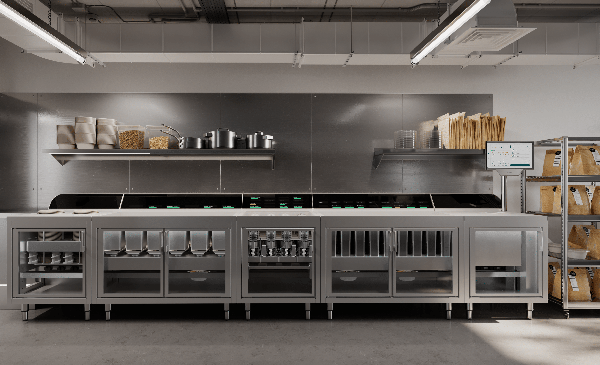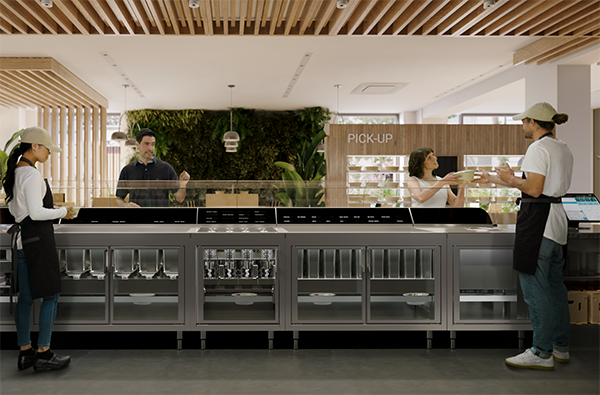Fast-food and fast-casual restaurants are serious about investing in robotics. Chipotle Mexican Grill Inc. yesterday said that its Cultivate Next venture fund is investing in Hyphen Technologies Inc., which is developing automation for kitchen operations, and Meati, which is developing processes for proteins made from mushroom root.
Newport Beach, Calif.-based Chipotle said its $50 million Cultivate Next fund “intends to make early-stage investments into strategically aligned companies that further the company's mission to 'Cultivate a Better World.'” Hyphen and Meati are part of its first cohort.
Chipotle had over 3,000 restaurants as of March 31 in the U.S., Canada, the U.K., France, and Germany. It claimed that is the only restaurant company of its size that owns and operates all its locations. Chipotle is ranked on the Fortune 500 and has more than 100,000 employees.
Hypen designs The Makeline to assemble digital orders
San Jose, Calif.-based Hyphen said it is developing kitchen automation to “help restaurant owners, operators, and budding chefs move their business forward.” The company said its first product, The Makeline, uses robotics and a customized operating system to give busy kitchens a reliable and precise way to make and fulfill orders. It raised $24 million in Series A funding in February.
The Makeline assembles all digital orders under the counter via automated production. This allows staff to assemble in-house orders from the top of the counter, said Hyphen.
The automated system can produce more than 350 meals an hour while eliminating order mistakes and cross-contamination, said Hyphen. The KitchenOS platform enables restaurants to create recipes in seconds, fulfill multiple orders from digital channels, and assist with kitchen-specific tasks, it added. Hyphen said its customers include some of the world's most innovative restaurant chains, virtual brands, and co-packers.
“Hyphen is reimagining the intersection between makelines and digital kitchens, with a focus on improving speed and order accuracy,” stated Curt Garner, chief technology officer at Chipotle. “Their use of robotics to enhance the employee and guest experience to find efficiencies in the restaurant industry aligns with our mission of leveraging emerging technology to increase access to real food.”
“Chipotle's investment in Hyphen will accelerate our hiring plans, allowing us to invest more heavily in R&D, all while providing the necessary infrastructure to scale sustainably,” said Stephen Klein, co-founder and CEO of Hyphen. “We're thrilled to work with Chipotle to find more innovative solutions by removing repetitive tasks from the employee experience so they can focus on creating delicious dishes and providing outstanding hospitality.”
Chipotle Cultivate Next seeks to solve pain points
Chipotle said it is “seeking opportunities that will elevate the human experience for its teams as well as increase access and convenience for its guests.” The Cultivate Next fund is looking for innovations in farming and supply chain, robotics, alternative proteins, and more.
Founded in 2017, Meati Foods has developed proprietary methods to provide protein alternatives to meat, improving environmental sustainability and nutrition. It grows the mushroom roots used in its products year-round in an indoors environment that is unexposed to pollutants, pesticides, antibiotics, or growth hormones.
The Boulder, Colo.-based company's Eat Meati product line debuted this month after sellouts in its online shop. Meati plans a national omnichannel footprint by late 2023.
“We are excited to support new ways to bring vegetables to the center of the plate though plant-based alternative protein options that mirror Chipotle's 'Food With Integrity' standards,” said Garner. “Meati is producing responsibly grown plant-based protein that tastes delicious.”
Chipotle said it will provide more updates on Cultivate Next leading into 2023. Companies interested in collaborating with Chipotle through its venture fund can apply by e-mailing [email protected].

Food automation still growing
With its aggressive goal of growing to 7,000 restaurants in North America, Chipotle said it is “committed to exploring ways to ease pain points experienced by restaurant employees.” The company recently tested Miso Robotics' Chippy, an autonomous kitchen assistant that works with artificial intelligence to make tortilla chips.
The global market for food robotics could expand from $530.18 million in 2021 to $981.14 million by 2028 at a compound annual growth rate (CAGR) of 9.19%, projected Precision Reports. Research and Markets predicted growth from $1.9 billion in 2021 to $3.9 billion by 2027 at a CAGR of 12.73%.
Allied Market Research was also bullish, forecasting growth from $2 billion in 2020 to $5.7 billion by 2031 at a CAGR of 10.4%. While estimates vary, the consensus among market research firms is that restaurant automation will grow in response to worker shortages and hygiene concerns.
In other food robotics news, Love's Travel Stops is piloting Jamba by Blendid robotic smoothie kiosks in Williams, Calif. In China, Pudu Robotics this week unveiled its PuduBot 2 for indoor deliveries.
PizzaHQ last week said it is partnering with Picnic Works to further automate its pizza-making processes. Piestro yesterday said Capriotti's Sandwich Shop will begin a pilot test of its Piestro Pod in its flagship Las Vegas location.
Article topics
Email Sign Up
















